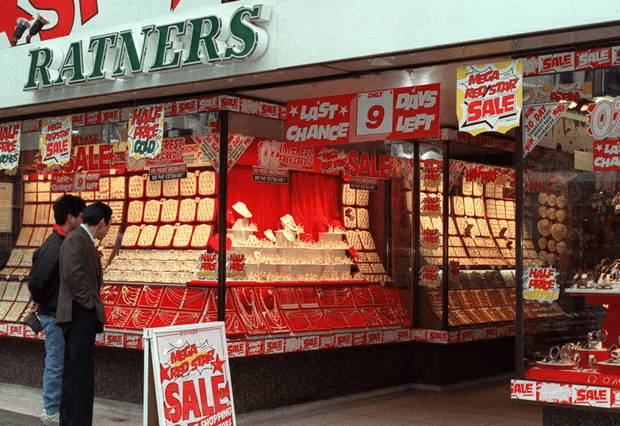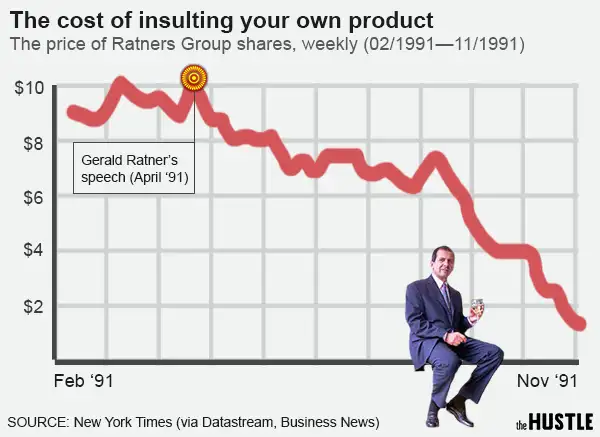- 1 January 2024
- No Comment
- 1567
Billion-Dollar Blunder: Unraveling a Business Empire in 10 Seconds

Have you ever heard of a son who built his father’s business into a multimillion-dollar empire in a mere six years, only to see it crumble in a matter of seconds?
Believe it or not, it’s true. This is the story of Gerald Ratner, a name infamous for the “Ratner effect.” Hi, I’m Nabeel Shaikh, and today we’re delving into the intriguing tale of Ratner’s rise and fall and the invaluable lessons hidden within this captivating narrative.
In London, a man named Gerald Ratner embarked on a journey that would take him from humble beginnings to the dazzling heights of success. Born on November 1, 1949, Ratners’ story is a gripping saga of a regular guy making it big in the world of jewelry retail.
Gerald Ratner didn’t start with fancy jewelry. He grew up in a regular family, facing challenges. But his journey took a surprising turn, making him well-known in the world of sparkly gems.
Crafting a Jewelry Empire: Gerald Ratners’ Entrepreneurial Journey
At 15, Gerald Ratner joined his father’s jewelry business in 1965 after being expelled from grammar school. Despite the initial label of “too stupid,” he immersed himself in the grassroots of the business, handling various tasks.
In the late 1970s, Gerald Ratner had an idea. He started Ratners Group, a small jewelry store in London. He didn’t realize that this simple start would turn into a huge success story.

From One Store to Jewelry Royalty
Upon inheriting Ratners Group (AKA “Ratners”) in 1984, it was a struggling entity with 120 conventional storefronts, annually facing losses of £350k (US$459k).
Under Gerald Ratner’s leadership, it quickly grew. By the early 1990s, this tiny store had become one of the biggest jewelry retail empires in the United Kingdom.
In a swift transformation, Ratners’ locations were adorned with eye-catching orange and red posters, shouting messages like “LAST CHANCE — MEGA RED STAR SALE!” and “SALE SALE SALE: HALF PRICE!”
Every item in the window boasted a clear price tag.
This approach proved wildly successful: by 1990, Ratners had expanded from 120 to over 2,000 stores, securing 50% of the UK’s jewelry market. Annual sales reached £1.2 billion (US$1.57 billion), with £125 million in profit. The acquisition of competing chains like Jared and Kay Jewelers further solidified Ratners’ dominance.
Affordable Elegance for All
Ratners’ Group stood out because of Ratners’ smart way of doing business. They offered affordable jewelry that everyone could enjoy. The shine of gemstones wasn’t just for a few; it was for everyone. Ratners’ charm and business skills pushed the company ahead, creating a journey that caught the attention of the whole nation.
Before the 1980s, jewelry was largely seen as elitist, with an average cost exceeding £300 (approximately US$950 today). Ratner, however, pivoted, targeting a broader working-class demographic. Earrings, bracelets, and rings were offered at an average price of just £20, with some as low as £1.
Ratner strategically placed affordable items at the forefront, playing pop music to enhance the shopping experience, as he later shared with the Financial Times.
The Formidable Presence in Retail
By the late 1980s, Ratners Group had grown into more than just a jewelry store—it had become a massive retail powerhouse. With over 2,500 stores all over the country, Ratner’s idea had become a major player, employing thousands of people and securing a strong position in the retail world. The stage was perfectly set for Ratners’ empire to shine even brighter.
The Unraveling: Gerald Ratner’s Shocking Revelation
As Gerald Ratner enjoyed the success of his jewelry empire, he had no idea that just one speech would completely change his life.
A Fateful Invitation to the Royal Albert Hall
In April 1991, Ratner got an invitation to speak at the Institute of Directors in the famous Royal Albert Hall in London. Little did the audience know that this event would become the center of a big corporate problem.
Shocking Words Unleashed
In a surprising turn of events, Ratner’s speech became a moment etched in history. The usually charismatic entrepreneur, celebrated for his business skills, unexpectedly criticized some of his own company’s products, branding them as
“total crap.”
The shock didn’t stop there— he even said that Ratners Group’s wine glasses were “cheaper than a prawn sandwich but probably wouldn’t last as long.”
The Royal Albert Hall, usually a place for joyous occasions, now became the backdrop for the unplanned unraveling of a business giant.
The Unforeseen Fallout
Ratner had no idea of the impact his honest words would have. This one speech turned out to be more than just a hit to his reputation—it shook the very core of Ratners Group. A storm was brewing, and the aftermath would reshape Gerald Ratner’s life and the destiny of his once-powerful empire.
In the wake of the controversy, the trust that Ratners Group had meticulously built with its customers crumbled like a delicate piece of jewelry.
The consequences were financial as well—share prices plummeted, losing a whopping £500 million, signaling a sharp decline in the company’s value. The sparkle of Ratners Group was dimming rapidly.
The Fallout Unleashed: Consequences of Ratner’s Words Gone Awry
As the aftermath of Gerald Ratner’s ill-fated speech unfolded, it brought forth a storm of consequences, shaking both his life and the empire he had so carefully constructed. Gerald had to say goodbye to his lavish lifestyle and job.
Media Mayhem and Public Outcry
The media swiftly jumped on the sensational story. Ratner’s critical words echoed in headlines, overshadowing the once-glamorous Ratner Group with a dark cloud. Public condemnation followed suit as loyal consumers began questioning the very essence of the products they had once proudly adorned themselves with.
Some folks say any publicity is good, but in this case, the negative media was far from ideal for anyone. So, why did he do it? It’s hard to believe he meant to stir up such trouble.
Boardroom Decisions and CEO’s Resignation
Amidst the chaos within the empire, the board of directors found themselves at a critical juncture. Decisive action was necessary, culminating in Ratner’s resignation as CEO in November 1992.
On his departure day, he sold his shares for a meager sum to settle the £1 billion (US$1.3 billion) owed to the bank, leaving with nothing.
The man who had guided the ship to greatness was now wrestling with the fallout of his own words. The once-mighty Ratners Group found itself at a crossroads, forever altered by the turbulent events that unfolded.
Image source: thehustle.co
Rising from Ashes: Gerald Ratner’s Journey of Redemption
The aftermath of Gerald Ratner’s speech wasn’t just a fall; it became the starting point for an unexpected journey of redemption.
Challenges on Every Front
As Ratners’ Group transformed into Signet Group, Gerald Ratner faced personal and financial hardships. The empire he had crafted crumbled, pushing him into bankruptcy and the daunting task of rebuilding not just a company but his entire life.
The makeover of Ratners’ business in the next three years, fueled by a refinancing package from its bankers, comes with significant changes.
Many shops in Britain are set to close their doors. Simultaneously, several stores in America are earmarked for closure, with the unfortunate prospect of more than 1,000 job losses.
This restructuring plan is a hefty investment, costing the group nearly £100 million.
Shares in Ratners took a hit, dropping 1/2 p to 11 1/2 p. This downturn values the group at a mere £33.7 million, a stark contrast to its peak in 1990, when it reached £840 million.
Back then, Mr. Ratner’s strategy of piling it high and selling it cheap in the world of jewelry retail seemed invincible. The winds of change, however, have reshaped the landscape.
Spark of Hope: Rebranding and Recovery
The jewelry business, now known as Signet Group, embarked on a tough journey to recover. The glimmer of resurgence shimmered on the horizon, but for Ratner, the path ahead was a steep climb toward redemption.
A Fresh Start: GeraldOnline and Motivational Speaking
In his quest for redemption, Ratner ventured into new territories. The launch of “GeraldOnline” marked his entry into the online jewelry business—a testament to his resilience. Beyond gems and gold, Ratner embraced a new role as a motivational speaker.
His talks became a platform to share the invaluable lessons learned from his dramatic fall, inspiring others with his journey from ruin to redemption.
Insights From Nabeel Shaikh
Timeless Lessons
Gerald Ratner’s story isn’t just a rollercoaster of success and failure; it’s a valuable lesson in the unpredictable world of business, emphasizing the crucial role of words and the essence of responsible leadership.
The Ripple Effect of a Single Statement
Ratner’s tale serves as a stark reminder of how a single statement can shake the foundations of a thriving business. His unintentional words became the trigger for the unraveling of a successful company, leaving an everlasting mark in the history of business.
A Harvard Business School study examining CEO misbehavior from 2000 to 2015 revealed that, on average, each inappropriate comment or action resulted in 250 negative news stories, some of which continued to be cited up to 5 years later. Moreover, companies experienced a 3.1% decline in stock prices.
While not directly comparable to “Doing a Ratner,” instances of business leaders making foolish public statements have led to tangible financial repercussions.
For instance, in 2018, Tesla stock suffered a 4-5% drop after Elon Musk made comments in April joking about bankruptcy and, later in July, referring to a Thai cave rescuer as a “pedo guy.”
Bouncing Back with Resilience
Even in the aftermath, Ratner’s story highlights the resilience of the human spirit. Moving from the pinnacle of success to the depths of corporate challenges, his journey becomes a testament to the power of learning from mistakes.
His subsequent reinvention as an entrepreneur and motivational speaker shines as a guiding light for those navigating their own turbulent journeys.
Signet Group’s Story of Recovery
The rebirth of Signet Group stands as proof of the enduring ability to recover and reinvent. The transformation from Ratners Group to Signet Group mirrors phoenix-like resilience, demonstrating that even in the face of extreme challenges, renewal is not just a possibility but a reality.
A Tale of Redemption and Renewal
Gerald Ratner’s narrative isn’t just a cautionary tale; it’s a beacon of hope. It reminds us that challenges can lead to redemption. Whether for individuals or businesses, finding a path to renewal is possible, showcasing the unyielding spirit that defines both the human experience and the corporate world.
The enduring legacy of Gerald Ratner is a testament to the belief that, after a fall, one can rise stronger and wiser, against all odds.
In Ratner’s journey, we see more than a business rise and fall; it’s a lesson in the unpredictable dance of success and adversity. Unleashed words reshape empires—Ratner faced consequences, not just corporate missteps but a testament to human resilience.
As a phoenix rises, Ratner’s reinvention as an entrepreneur and motivational speaker inspires those on turbulent paths. The rebranded Signet Group proves recovery is possible, even in the face of daunting challenges.
Gerald Ratner’s enduring legacy is the belief that redemption and renewal follow a fall. His journey is a reminder that setbacks aren’t the end but the start of a new, stronger chapter against all odds.




